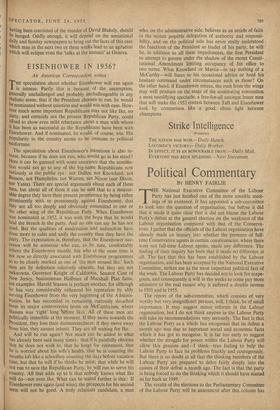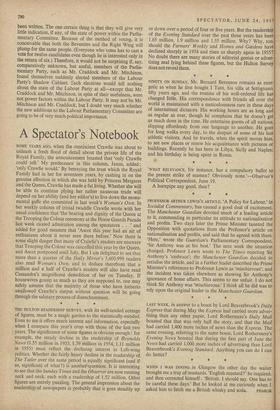Political Commentary
BY HENRY FAIRLIE THE National Executive Committee of the Labour Party has just finished one of the more sensible meet- ings of its existence. It has appointed a sub-committee to look into the question of organisation, but before it did that it made it quite clear that it did not blame the Labour Party's defeat at the general election on the weakness of the Labour organisation compared with that of the Conserva- tives. I gather that the officials of the Labour organisation have already made an inquiry into whether the presence of full- time Conservative agents in certain constituencies, where there were not full-time Labour agents. made any difference. The finding of their inquiry has been that it made no difference at all. The fact that this has been established by the Labour organisation, and has been accepted by the National Executive Committee, strikes me as the most important political fact of the week. The Labour Party has decided not to look for scape- goats. and consequently it will in the weeks to come pay more attention to the real reason why it suffered a double reverse in 1951 and in 1955.
The report of the sub-committee, which consists of very worthy but very insignificant persons, will. I think, be of small importance. It may suggest minor reforms in the Labour organisation, but I do not think anyone in the Labour Party will take its recommendations Very seriously. The fact is that the Labour Party as a whole has recognised that its defeat a month ago was due to important social and economic facts which it has got to recognise. It is far too early to suggest whether the struggle for power within the Labour Party will allow this genuine and—I think—true feeling to help the Labour Party to face its problems frankly and courageously. But there is no doubt at all that the thinking members of the Labour Party are prepared to delve fairly deeply into the causes of their defeat a month ago. The fact is that the party is being forced to do the thinking which it should have started as far back as 1949.
The results of the elections to the Parliamentary Committee of the Labour Party will be announced after this column has been written. The one,certain thing is that they will give very little indication, if any, of the state of power within the Parlia- mentary Committee. Because of the method of voting, it is conceivable that both the Bevanites and the Right Wing will plump for the same people. (Everyone who votes has to cast a vote for twelve candidates even though he is interested only in the return of six.) Therefore, it would not be surprising if, say, comparatively unknown, but useful, members of the Parlia- mentary Party, such as Mr. Craddock and Mr. Mitchison, found themselves suddenly elected members of the Labour Party's Shadow Cabinet. Such elections would tell nothing about the state of the Labour Party at all—except that Mr. Craddock and Mr. Mitchison, in spite of their usefulness, were not power factors within the Labour Party. It may not be Mr. Mitchison and Mr. Craddock, but I doubt very much whether the new additions to the Labour Parliamentary Committee are going to be of very much political importance.


















































 Previous page
Previous page